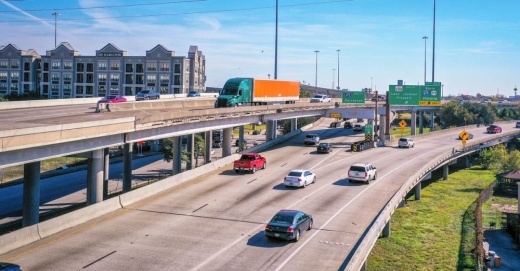The NHHIP is being led by the Texas Department of Transportation. As previously reported by Community Impact Newspaper, the $9.78 billion project was put on pause by the Federal Highway Administration—a division of the U.S. Department of Transportation—as it investigates allegations of civil rights violations from nearby residents.
Located at 610 St. Emanuel St., Houston, the Lofts at the Ballpark were acquired by the Texas Department of Transportation earlier on in the process with plans for demolition to make room for the project.
The NHHIP would expand I-45 with an addition of four managed express lanes from downtown Houston to Beltway 8 North and realign the main lanes that connect the east side of the city to downtown. According to TxDOT, this plan would ultimately improve safety by "eliminating unsafe weaving.”
According to a June 23 press release from Houston Mayor Sylvester Turner’s office, contractors for the project applied for permits to disconnect utilities and applied for street and sidewalk permits associated with the planned demolition. When questions began to come forward on whether the demolition process complied with the FHWA’s pause on the project, the Houston Permitting Department placed an administrative hold on the project and permit, the release said.
A finding is pending on whether the property was purchased prior to the FHWA’s pause, the release said. If the purchase was made before the pause, then it is considered as an early acquisition, which would allow TxDOT to continue with the demolition process. As of June 21, documents supporting the date of the sale have been requested, the release said.
“TxDOT has indicated it will not be seeking any further permits,” Turner said in the release. “State and federal properties are exempt from local building codes and do not require demolition permits. Assuming no objection by FHWA, and no demolition permit being requested by TXDOT, the city has no legal basis to stop the demolition.”
Although TxDOT was originally set to only acquire one building from the Lofts at the Ballpark complex, it was later found TxDOT purchased the entire property, the release said.
During a June 22 Houston City Council meeting, Turner expressed his disapproval of the property purchase and demolition.
During the meeting, Turner requested TxDOT pledge a net-zero housing loss, providing funding to replace any housing that is taken as part of the project. A total of 375 units will be demolished at the Lofts at the Ballpark under TxDOT's plans.
Turner also said the project could also reduce affordability and inventory, worsening the homeless situation in the city.
In a June 20 statement from TxDOT, officials said all tenants from the Lofts at the Ballpark have been successfully relocated. TxDOT claimed delays to the demolition process present public health and safety concerns.
“Vacant buildings such as these have attracted illicit and illegal activity, which would be burdensome to the city, local communities [and] businesses in the vicinity and potentially exposes TxDOT to an array of liabilities,” the statement said. “TxDOT has consistently been responsive to and respectful of FHWA’s terms and conditions regarding the NHHIP ‘pause’ and demo of this property is not in conflict with those terms, neither in rule nor spirit.”
TxDOT district engineer Eliza Paul, addressed the concerns during a June 24 Houston-Galveston Area Council meeting. She said the whole property was acquired—as opposed to just one building—because damage would be made to the other two buildings by taking only the first building, which held a pool and exercise room. At the initial point of purchase, it was not TxDOT's intention to acquire the entire property, she said.
She said the property owner allowed the early acquisition to take place, and the negotiations between TxDOT and the property owner took place before the purchase of the full property. The full building is being demolished because TxDOT has no authority to use it in another way, she said.
“We don't have the capability or ability to secure the building and try to do something else with the building,” Paul said.
During public comment, members from the organization Stop TxDOT I-45 asked the H-GAC to reconsider their support of the project. Advocates said they would rather see the money be put into other projects, such as light rails, bus rapid transit, cycling infrastructure and other highway improvements that would help travel around the city.
“This will ruin life in Houston for the next 20 years with construction,” public speaker Chloe Cook said. “People are dying [in crashes], and even starting this project will make it worse. There is no honor in building the biggest freeway on Earth. It is embarrassing on a national scale.”





